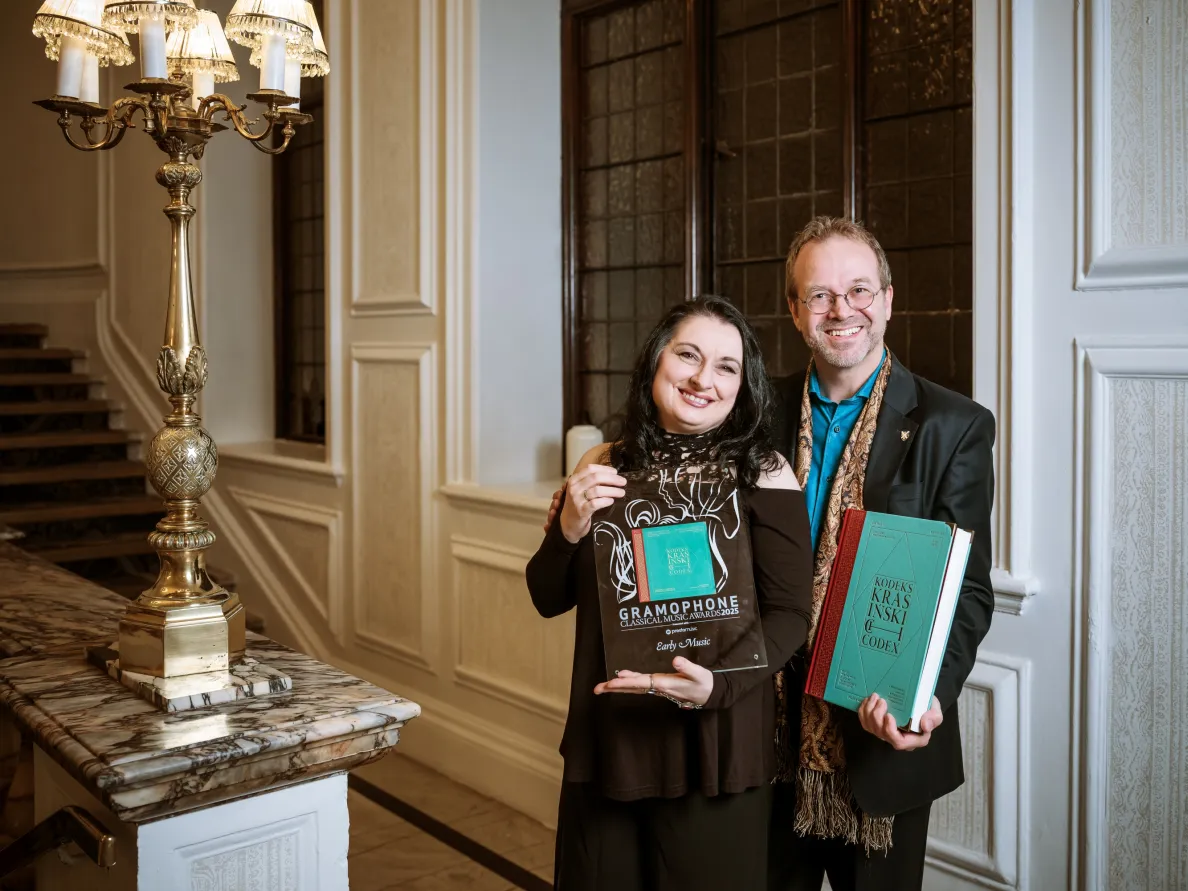Gramophone Classical Music Award 2025 for the Krasiński Codex Project

Polish polyphony from the time of King Władysław Jagiełło has gained international recognition. The album “Krasiński Codex”, based on a medieval manuscript from the collection of the National Library, has been awarded the prestigious Gramophone Classical Music Award 2025 in the Early Music category. Agnieszka Budzińska-Bennett and Marc Lewon received the award on stage on 15 October 2025 during a gala ceremony at the De Vere Grand Connaught Rooms in London. The three-disc release is one of the outcomes of the “Kras 52” project, carried out by the Adam Mickiewicz Institute in cooperation with the Polish Music Publishing House.
Poland’s Musical Heritage Rewarded – the Success of the “Kras 52” Project
Almost forty pieces were written down in a manuscript dating from 1426–1450, originally kept at the Royal Castle in Kraków. After nearly five centuries of turbulent history, the manuscript entered the Krasiński Library collection in the twentieth century, giving the project its name – “Kras 52”. Thanks to an exceptional set of circumstances, it survived the destruction of the Second World War and is now one of the most valuable musical treasures in the holdings of the National Library in Warsaw.
This manuscript is the most important source of polyphonic music from fifteenth-century Poland. It includes compositions from across Europe and bears witness to the cultural flourishing of Poland in the late Middle Ages. The collection brings together music by Italian and French composers such as Johannes Ciconia and Antonio Zachara da Teramo, alongside Polish works by Mikołaj of Radom and Mikołaj of Ostroróg, who set numerous texts by Stanisław Ciołek to music. Most of the pieces are three-part vocal–instrumental compositions with Latin texts, encompassing both liturgical works and secular songs and ballads.
The First Complete Recording of the “Krasiński Codex” – Medieval Music Performed Masterfully
The “Krasiński Codex” – the first complete recording of music from this manuscript – was produced under the direction of Agnieszka Budzińska-Bennett. The international Ensemble Dragma presented a rich array of medieval instruments, while Ensemble Peregrina delivered pure and stylistically refined vocal interpretations. The contents of the manuscript were divided into three programmes – corresponding to three CDs – each reflecting the diversity of fifteenth-century polyphony in its cultural and historical context:
-
CD 1 – Regina Gloriosa (Marian songs from medieval Kraków)
-
CD 2 – Cracovia (Songs for Kraków and the royal court)
-
CD 3 – Missae et Motetti (European masters and native compositions)
The fifty-seven pieces include vocal compositions, instrumental interludes, and mixed forms. Each twenty-minute sequence unveils a distinct musical world, offering genuine treasures of early polyphony.
The recording features:
-
Agnieszka Budzińska-Bennett – vocals, Gothic harp, ensemble leader
-
Grace Newcombe – vocals, Gothic harp, clavisymbalum, organ
-
Marc Lewon – vocals, fiddle, lute, gittern
-
Lorenza Donadini, Hanna Järveläinen, Tessa Roos, Matthieu Romanens, Raitis Grigalis, Reiner Schneider-Waterberg, Jean-Christophe Groffe – vocals
-
Jane Achtman, Elizabeth Rumsey, Caroline Ritchie – fiddle
-
Cameron Drayton, Henry Van Engen – trombone
Reviewers from “Gramophone” magazine praised the recording for its exceptional artistic quality, noting that Mikołaj of Radom has finally received a presentation worthy of his elegant and sophisticated music. They drew attention to the intimate character of the recording, the freshness of interpretation and the outstanding vocal quality – particularly of Agnieszka Budzińska-Bennett and Grace Newcombe – as well as the precision and fluidity of the instrumental playing. The reviewers also appreciated the performers’ artistry in tackling works with fragmentary transcriptions. The album’s dazzling diversity and the imaginative, spirited approach to the medieval repertoire were likewise highlighted.
Polish manuscript from the National Library captivates the world once again – concerts, albums, publications
Before the ensembles recorded a three-disc album containing all the pieces from the manuscript – creating the first complete performance of this source in history – the “Kras 52” project had been carefully developed by the Adam Mickiewicz Institute in cooperation with the Polish Music Publishing House. Based on the manuscript, the concert programme was presented in Switzerland and Lithuania, among other places, and the events were accompanied by lectures and workshops. The manuscript itself underwent a comprehensive reconstruction. Scholars and artists prepared works adapted to the needs of contemporary audiences and performers – musical transcriptions were created, accompanied by essays, commentaries, short biographies of composers and poets, a glossary of terms and alternative performance suggestions. The result of this work is a bilingual publication: “Kodeks Krasińskich (Warszawa, Biblioteka Narodowa, Rps 8054 III). Edycja wykonawcza z esejami i komentarzem krytycznym” [“The Krasiński Codex (Warsaw, the National Library, Rps 8054 III). A Performer’s Edition with Essays and a Critical Commentary”].
The manuscript has also become an inspiration for contemporary artists. In December 2024, the album “Laeta Mundus” was released, in which 15th-century polyphony intertwines with modern jazz in a new harmony of spheres. The composer and leader of this artistic dialogue was violinist Adam Bałdych, accompanied by the Ensemble Peregrina under the direction of Agnieszka Budzińska-Bennett and double bass clarinettist Michał Górczyński.
International triumph for Polish artists – Krasiński Codex wins the Gramophone Classical Music Award 2025
The Gramophone Classical Music Awards are among the most prestigious honours in the world of classical music. Presented since 1977 by the British magazine “Gramophone”, they recognise the most outstanding performers, conductors, ensembles, and recordings distinguished by exceptional artistic and technical merit. Often referred to as the “Oscars of classical music”, the award is regarded as a hallmark of excellence in the industry.
The winners are selected by a panel of experts and critics who assess interpretation, stylistic fidelity, innovation and recording quality. The awards ceremony traditionally takes place in September in London. Over more than four decades, Polish artists have received these prestigious statuettes on numerous occasions – previous winners include Piotr Anderszewski, Jakub Józef Orliński, the Silesian Quartet, and the Polish National Youth Choir. In 2025, alongside the “Krasiński Codex” project, the album “Brahms: Piano Quartets Nos. 2 & 3” was also awarded, with Krystian Zimerman, Maria Nowak, Katarzyna Budnik, and Yuya Okamoto receiving the statuette in the Chamber category. The Gramophone Classical Music Awards not only celebrate outstanding achievements, but also inspire future generations of musicians and listeners to explore the richness of classical music.
The Adam Mickiewicz Institute extends its warmest congratulations to the winners!


